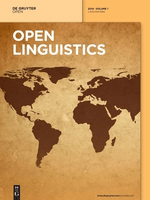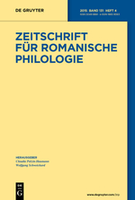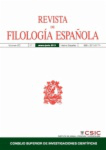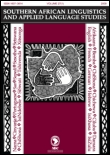
Revista da Anpoll
Scope & Guideline
Exploring innovative research in linguistics and literature.
Introduction
Aims and Scopes
- Text Linguistics and Discourse Analysis:
A core focus of the journal is on text linguistics and discourse analysis, examining the structure, function, and social implications of texts in various forms, including digital media and literary works. - Interdisciplinary Approaches:
The journal promotes interdisciplinary research, drawing from fields such as semiotics, sociolinguistics, and cultural studies to enrich the understanding of language in context. - Technodiscursivity:
A unique contribution of the journal is its emphasis on technodiscursivity, exploring the interplay between language and technology, particularly in digital communication platforms. - Language Policy and Education:
The journal addresses issues of language policy, education, and identity, particularly in relation to indigenous languages, bilingualism, and the role of language in social justice. - Cultural and Literary Studies:
Research on cultural narratives, literary criticism, and the role of literature in shaping discourse is a significant area of focus, often linking linguistic analysis with broader cultural themes.
Trending and Emerging
- Digital Discourse and Social Media:
There is a growing emphasis on the analysis of digital discourse, particularly in social media contexts, reflecting the impact of technology on language use and communication practices. - Intertextuality and Cultural Narratives:
Research exploring intertextuality, particularly in popular culture and media, has gained prominence, highlighting the interconnectedness of texts and their cultural implications. - Critical Discourse Analysis:
An increase in critical discourse analysis reflects a trend towards examining power dynamics, ideology, and representation in language, particularly in political and social contexts. - Language and Identity:
Explorations of language as a marker of identity, particularly related to gender, ethnicity, and social class, are emerging as significant themes in the journal, reflecting broader societal discussions. - Multimodal Approaches to Language:
There is a notable trend towards multimodal analysis, integrating visual, textual, and auditory elements in the study of communication, which aligns with contemporary media consumption patterns.
Declining or Waning
- Traditional Linguistic Studies:
There appears to be a waning focus on more traditional linguistic studies, such as syntax and phonetics, which have been overshadowed by emerging themes that emphasize discourse and social context. - Historical Linguistics:
Historical approaches to linguistics, which analyze the evolution of language over time, seem to be less prevalent in recent publications compared to contemporary analyses that focus on current usage and digital communication. - Narrowly Defined Sociolinguistic Studies:
Research that narrowly focuses on specific sociolinguistic phenomena without interdisciplinary connections is becoming less common, as the journal increasingly favors broader, integrative studies.
Similar Journals

Cadernos de Estudos Linguisticos
Innovating the study of language for tomorrow's scholars.Cadernos de Estudos Linguisticos, published by UNIV ESTADUAL CAMPINAS, INST ESTUDOS LINGUAGEM, stands as a pivotal platform in the field of linguistic studies since its inception in 1978. With its commitment to Open Access, this journal fosters the dissemination of cutting-edge research, ensuring that knowledge is accessible to a global audience. This also enhances collaboration among researchers, professionals, and students dedicated to exploring the nuances of language. The journal proudly carries the ISSN 0102-5767 and E-ISSN 2447-0686, attesting to its uninterrupted quality and relevance in linguistic scholarship. By addressing various facets of language studies, including syntax, semantics, and sociolinguistics, this esteemed journal is a vital resource for advancing understanding and innovation in the field.

Cultura Lenguaje y Representacion-Revista de Estudios Culturales de la Universitat Jaume I
Celebrating Diversity in Language and RepresentationCultura Lenguaje y Representacion - Revista de Estudios Culturales de la Universitat Jaume I is a premier open-access journal dedicated to the exploration of cultural studies, linguistic discourse, and literary theory, published by the esteemed Universitat Jaume I. Since its inception in 2004, the journal has consistently aimed to provide a vibrant platform for interdisciplinary research and critical reflection within the fields of communication, literature, and cultural representation. With its impressive rankings in the Scopus database—placing in the 93rd percentile for Literature and Literary Theory and the 73rd percentile for Cultural Studies—this journal is recognized for its impactful contributions to academic discussions. Operated out of Castelló de la Plana, Spain, the publication not only welcomes contributions from seasoned scholars but also encourages emerging researchers to submit innovative works. By maintaining a dedication to accessibility and quality, Cultura Lenguaje y Representacion positions itself as an essential resource for scholars, practitioners, and students seeking to deepen their understanding of the intricate relationship between culture, language, and representation.

Open Linguistics
Championing open dialogue in diverse linguistic fields.Open Linguistics is a premier open access journal dedicated to advancing the field of linguistics, published by DE GRUYTER POLAND SP Z O O. Since its inception in 2014, the journal has consistently provided a platform for innovative research and critical discourse in various subfields of linguistics. With an impressive Q1 ranking in the linguistics category as of 2023, Open Linguistics is recognized for its significant contributions, ranking #223 out of 1088 in Arts and Humanities, as well as achieving a commendable #260 out of 1167 in Social Sciences. The journal's open access policy ensures that research is freely accessible to both scholars and practitioners, fostering a collaborative and inclusive academic community. With a focus on original research, reviews, and theoretical papers, Open Linguistics is positioned as an essential resource for researchers, educators, and students seeking to deepen their understanding of language and its diverse applications in society.

ZEITSCHRIFT FUR ROMANISCHE PHILOLOGIE
Illuminating the Intricacies of Romance Linguistics and LiteratureZEITSCHRIFT FUR ROMANISCHE PHILOLOGIE, published by Walter de Gruyter GmbH, stands as a prominent peer-reviewed journal dedicated to the fields of Linguistics, Literature, and Literary Theory. Established in 1877 and continuing its legacy to the present day, this esteemed journal offers a platform for comprehensive scholarship that explores the intricacies of Romance languages and their literary heritage. With a notable Q1 ranking in Literature and Literary Theory and a Q2 ranking in Linguistics and Language, it has secured its place among leading resources in the humanities. Researchers, educators, and students benefit from its rich historical context and current contributions to the understanding of Romance languages and literature. Though currently not available as Open Access, the journal prioritizes the dissemination of high-quality research, making significant strides in fostering academic dialogue and advancement. Its address at Genthiner Straße 13, Berlin, Germany, situates it in a hub of scholarly activity, bridging the past with contemporary literary discourse.

REVISTA DE FILOLOGIA ESPANOLA
Fostering Academic Dialogue in Spanish PhilologyREVISTA DE FILOLOGIA ESPANOLA is a distinguished academic journal dedicated to the fields of linguistics and literature, published by the CONSEJO SUPERIOR INVESTIGACIONES CIENTIFICAS (CSIC) since 1954, and has been an Open Access journal since its inception. Situated in Madrid, Spain, this journal has emerged as a crucial platform for the dissemination of scholarly research, with notable rankings including Q2 in Linguistics and Language and Q1 in Literature and Literary Theory as of 2023. The journal's commitment to fostering academic dialogue is reflected in its impressive Scopus rankings, including a 79th percentile in the Arts and Humanities for Literature and Literary Theory. Covering a wide range of topics from linguistic theory to literary critique, REVISTA DE FILOLOGIA ESPANOLA is essential reading for researchers, professionals, and students alike, providing valuable insights and cutting-edge research in the ever-evolving landscape of Spanish philology.

Estudios de Linguistica-Universidad de Alicante-ELUA
Championing Accessibility in Cutting-edge Linguistic StudiesEstudios de Linguistica-Universidad de Alicante-ELUA is a distinguished academic journal dedicated to advancing the field of linguistics, published by Universidad de Alicante. With an Open Access model adopted since 2020, ELUA facilitates greater accessibility to pioneering research for scholars and enthusiasts alike. The journal's ISSN is 0212-7636 and its E-ISSN is 2171-6692, ensuring it is indexed and easily discoverable in academic databases. Though the journal's H-Index is currently not specified, its commitment to disseminating high-quality linguistics research positions it as a valuable resource for researchers, professionals, and students. The journal aims to foster scholarly dialogue and innovation in various linguistic domains, making it an essential platform for sharing insights and findings that shape contemporary linguistic studies. Based in Alicante, Spain, ELUA is poised to contribute significantly to the global linguistics landscape.

BOLETIN DE LA REAL ACADEMIA ESPANOLA
Fostering Insightful Discussions in Language ResearchBOLETIN DE LA REAL ACADEMIA ESPANOLA, published by the Real Academia Española, serves as a central conduit for scholarly discourse in the fields of Linguistics and Language. With an ISSN of 0210-4822 and an E-ISSN of 2445-0898, this esteemed journal has been disseminating impactful research since its inception in 2003. As a recognized Q2 journal in Linguistics and Language for 2023, it ranks in the 45th percentile in Arts and Humanities and 42nd percentile in Social Sciences according to Scopus metrics, reflecting its solid position in academic circles. Although not an open-access journal, it remains a crucial resource for those engaged in the vibrant study of language, providing insights that inform both theoretical frameworks and practical applications. Researchers, professionals, and students alike will find prominent studies and discussions that contribute to the evolution of linguistic scholarship. The journal is published in Madrid, Spain—an environment rich in linguistic heritage that further enhances its significance in the global academic community.

Revista Letras
Advancing Literary Discourse Across BordersRevista Letras (ISSN: 0100-0888, E-ISSN: 2236-0999) is a prominent academic journal published by Universidade Federal do Paraná, Editora, renowned for its commitment to advancing knowledge in the fields of literature, linguistics, and cultural studies. As a pivotal platform for scholarly exchange, the journal aims to foster rigorous research and interdisciplinary dialogue, addressing themes relevant to both Brazilian and global literature. With an emphasis on open access, Revista Letras ensures that its research is widely disseminated, enabling greater accessibility for researchers, professionals, and students alike. Located in Curitiba, Paraná, Brazil, the journal actively participates in the academic community, contributing to the ongoing conversation surrounding literary and linguistic studies. Its dedication to quality scholarship makes it an invaluable resource for anyone looking to deepen their understanding of these dynamic fields.

Archivum
Bridging Academia and Open Knowledge Since 1951Archivum, published by UNIV OVIEDO in Spain, stands as a vital resource in the fields of Linguistics and Language as well as Literature and Literary Theory. With an impact factor reflective of its commitment to scholarly excellence, this journal has proudly maintained an Open Access model since 1951, ensuring that its rich repository of knowledge is freely available to researchers, professionals, and students alike. Covering a converged span from 2019 to 2023, Archivum has strategically positioned itself within the academic milieu, currently categorized in the Q4 for Linguistics and Language and Q3 for Literature and Literary Theory as of 2023. The journal is indexed in Scopus, with rankings that reflect its growing influence, such as #690 in Literature and Literary Theory and #887 in Language and Linguistics. Despite its challenges in visibility, Archivum remains essential for those seeking to engage with contemporary discussions and research within the humanities. Located in the heart of Asturias, it embodies the scholarly spirit of Spain, fostering a collaborative environment for innovation and inquiry in linguistic and literary studies.

Southern African Linguistics and Applied Language Studies
Fostering Innovation in Language StudiesSouthern African Linguistics and Applied Language Studies is a prestigious journal dedicated to the exploration and analysis of linguistics and applied language studies within the Southern African context. Published by Taylor & Francis Ltd, this esteemed journal has established itself as a significant platform for scholars and practitioners since its inception in 2003. With an impressive Q2 ranking in the Linguistics and Language category and a current Scopus rank of #430 out of 1167, it occupies a vital position in the academic landscape, appealing to a diverse readership keen on linguistic research, language policy, and applied linguistics. While the journal is not currently open access, it provides comprehensive insights and scholarly articles that foster understanding and innovation in linguistic practices and language education. As of 2024, the journal continues to deepen its impact through rigorous peer-review and a commitment to advancing knowledge, making it a key resource for researchers, educators, and students seeking to navigate the complexities of language within the Southern African region and beyond.